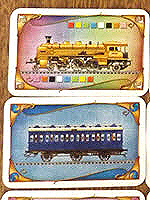For many board game enthusiasts, Ticket to Ride was the gateway game that led them into the hobby. With a bit of hand management, some set collection, and a lot of route building, Ticket to Ride brought something to the table that American games like Monopoly, Sorry, or even Clue could not do: introduce a stronger sense of agency by not using dice.
For those of you who are not familiar with Ticket to Ride, the base game has a map of the continental United States with cities connected by routes comprised of colored (or gray) rectangles. Each player starts with 45 plastic train pieces, four train cards of various colors, and one to three "destination tickets," which players are required to finish lest they lose game points. During a turn, each player has three choices: draw two cards from the river (five face-up cards in a row) or deck (or one wild card locomotive from the river); play a color set of cards to put train pieces between two cities to complete a route; or, draw three more destination tickets, keeping at least one.
As the game progresses, players accumulate cards, complete connections (which yields points depending on how many train pieces are required to finish the route), and work towards completion of their destination tickets; for instance, one destination ticket might require a player to connect Los Angeles to New York. The game ends when one player has only three or fewer train pieces remaining in his or her inventory; at that point, every other player gets one last turn. Then, the points from completed destination tickets are added to one's total, and points are subtracted for every ticket that is not completed. The highest scoring player wins.
Unlike popular pariah Monopoly (which tends to be despised by numerous board game hobbyists), Ticket to Ride does not rely on dice for movement (though randomness is an integral part of the game). Sure, Ticket to Ride involves a "river" of five cards that appear randomly from a deck, but players get to choose which cards to take and routes to build. Randomness still prevails, not only in the form of the card draw, but also in the destination tickets each player draws; yet, each player can go in the directions they want to go. As a beginner, players can focus on completing destination tickets; the more experience one gains, the more one may attempt to block their opponents from finishing their tickets. The more one plays, the more cutthroat strategies present themselves; as with many games, players benefit from experience, but with the level of randomness present in the game, any beginner has a chance to steal a victory, especially if they grok the game's intricacies quickly. In other words, unlike the dice mavens among classic American board games, Ticket to Ride provides a decision space that allows for a play style and an approach.
Since Ticket to Ride emerged in 2006, it has been one of the quintessential starter games: easy to learn, but with enough deeper strategy to suggest that there is more to board games than rolling and moving. In 2010, Ticket to Ride (and Pandemic) was my gateway into the hobby. However, since that time, thousands of games have been created. Many would argue that there are route-building, card drafting, and/or set collection games that implement those mechanics better or in more intriguing ways than Ticket to Ride.
Should I trash or treasure Ticket to Ride?
At its weight (1.85 out of 5, according to Board Game Geek), I contend that there is no game that combines card drafting, route building and set collection more simply and elegantly than Ticket to Ride. There are some excellent heavier games like Power Grid and Brass that have implemented route building well, and there are an innumerable amount of games that involve drafting and set collection, but Ticket to Ride is the one that anyone can use as a launchpad into those more complex games. Even more important that that, Ticket to Ride is a gorgeous production from Days of Wonder, which has proven to be a brand that emphasizes art and beauty, even at the expense of game design (especially in their more recent designs as of late 2021), and Ticket to Ride is no exception. It's pretty to behold, the maps are fascinating with their little artsy flourishes, and every card is intricately drawn with steampunk Victorian inspiration. Ticket to Ride truly represents the best of gateway game design and execution.
I have been tempted to sell Ticket to Ride because I own 70 other games that I want to play at any given time. Yet, if I'm hosting guests and they are relatively new to hobby board gaming, Ticket to Ride is one of those staples that I am happy to present to those guests. Admittedly, I sold my base Ticket to Ride in favor of buying Ticket to Ride Europe just to get stations, but I still own some form of Ticket to Ride. Thus, I treasure Ticket to Ride.
Should you trash or treasure Ticket to Ride?
If you own it, I strongly recommend treasuring it. Why not? Not all of your friends (I hope) are hobby gamers, so Ticket to Ride is invaluable for connecting with them.If you don't own it, go buy it. Funnily enough, it can be found everywhere: in big-box stores like Target, online through Amazon, and even in the discount retail stores.
***
I really don't think there has been a true replacement for Ticket to Ride. You could convince me otherwise in the comments section, but it's a rare design that can only be imitated, not replaced.





